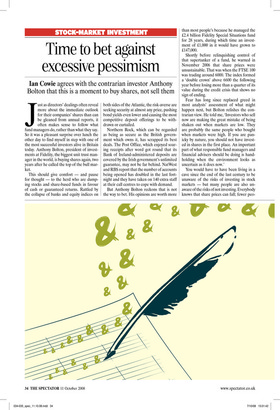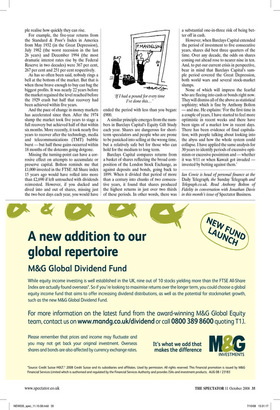Time to bet against excessive pessimism
Ian Cowie agrees with the contrarian investor Anthony Bolton that this is a moment to buy shares, not sell them Just as directors’ dealings often reveal more about the immediate outlook for their companies’ shares than can be gleaned from annual reports, it often makes sense to follow what fund managers do, rather than what they say. So it was a pleasant surprise over lunch the other day to find myself in step with one of the most successful investors alive in Britain today. Anthony Bolton, president of investments at Fidelity, the biggest unit trust manager in the world, is buying shares again, two years after he called the top of the bull market.
This should give comfort — and pause for thought — to the herd who are dumping stocks and share-based funds in favour of cash or guaranteed returns. Rattled by
33 Spt DP 125400_06 30/9/08 the collapse of banks and equity indices on
both sides of the Atlantic, the risk-averse are seeking security at almost any price, pushing bond yields even lower and causing the most competitive deposit offerings to be withdrawn or curtailed.
Northern Rock, which can be regarded as being as secure as the British government which owns it, has scrapped its best deals. The Post Office, which enjoyed soaring receipts after word got round that its Bank of Ireland-administered deposits are covered by the Irish government’s unlimited guarantee, may not be far behind. NatWest and RBS report that the number of accounts being opened has doubled in the last fortnight and they have taken on 140 extra staff at their call centres to cope with demand.
But Anthony Bolton reckons that is not the way to bet. His opinions are worth more than most people’s because he managed the £2.4 billion Fidelity Special Situations fund for 28 years, during which time an investment of £1,000 in it would have grown to £147,000.
Shortly before relinquishing control of that supertanker of a fund, he warned in November 2006 that share prices were unsustainable. That was when the FTSE 100 was trading around 6000. The index formed a ‘double crown’ above 6600 the following year before losing more than a quarter of its value during the credit crisis that shows no sign of ending.
Fear has long since replaced greed in most analysts’ assessment of what might happen next, but Bolton relishes the contrarian view. He told me, ‘Investors who sell now are making the great mistake of being shaken out when markets are low. They are probably the same people who bought when markets were high. If you are panicky by nature, you should not have invested in shares in the first place. An important part of what responsible fund managers and financial advisers should be doing is handholding when the environment looks as uncertain as it does now.’ You would have to have been living in a cave since the end of the last century to be unaware of the risks of investing in stock markets — but many people are also unaware of the risks of not investing. Everybody knows that share prices can fall; fewer peo ple realise how quickly they can rise.
For example, the five-year returns from the Standard & Poor’s Index in America from May 1932 (in the Great Depression), July 1982 (the worst recession in the last 26 years) and December 1994 (the most dramatic interest rates rise by the Federal Reserve in two decades) were 367 per cent, 267 per cent and 251 per cent respectively.
As has so often been said, nobody rings a bell at the bottom of the market. But that is when those brave enough to buy can bag the biggest profits. It was nearly 22 years before the market regained the level reached before the 1929 crash but half that recovery had been achieved within five years.
And the pace of change in money markets has accelerated since then. After the 1974 slump the market took five years to stage a full recovery but achieved half of that within six months. More recently, it took nearly five years to recover after the technology, media and telecommunications (TMT) bubble burst — but half those gains occurred within 18 months of the dotcoms going dotgone.
Missing the turning-point can have a corrosive effect on attempts to accumulate or preserve capital. Bolton reminds me that £1,000 invested in the FTSE All Share index 15 years ago would have rolled into more than £2,690 if left untouched with dividends reinvested. However, if you ducked and dived into and out of shares, missing just the two best days each year, you would have ended the period with less than you began: £900.
A similar principle emerges from the numbers in Barclays Capital’s Equity Gilt Study each year. Shares are dangerous for shortterm speculators and people who are prone to be panicked into selling at the wrong time, but a relatively safe bet for those who can hold for the medium to long term.
Barclays Capital compares returns from a basket of shares reflecting the broad composition of the London Stock Exchange, as against deposits and bonds, going back to 1899. When it divided that period of more than a century into chunks of two consecutive years, it found that shares produced the highest returns in just over two thirds of these periods. In other words, there was a substantial one-in-three risk of being better off in cash.
However, when Barclays Capital extended the period of investment to five consecutive years, shares did best three quarters of the time. Over any decade, the odds on shares coming out ahead rose to nearer nine in ten. And, to put our current crisis in perspective, bear in mind that Barclays Capital’s sample period covered the Great Depression, both world wars and several stock-market slumps.
None of which will impress the fearful who are fleeing into cash or bonds right now. They will dismiss all of the above as statistical sophistry; which is fine by Anthony Bolton — and me. He explains: ‘For the first time in a couple of years, I have started to feel more optimistic in recent weeks and there have been signs of a market low in recent days. There has been evidence of final capitulation, with people talking about looking into the abyss and how the whole system could collapse. I have applied the same analysis for 30 years to identify periods of excessive optimism or excessive pessimism and — whether it was 9/11 or when Kuwait got invaded — invested by betting against them.’ Ian Cowie is head of personal finance at the Daily Telegraph, the Sunday Telegraph and Telegraph.co.uk. Read Anthony Bolton of Fidelity in conversation with Jonathan Davis in this month’s issue of Spectator Business.











































































 Previous page
Previous page